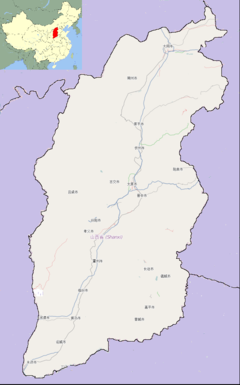Datong
|
Datong 大同市 |
||||||||||
|---|---|---|---|---|---|---|---|---|---|---|
| Prefecture-level city | ||||||||||
From top down, left to right: Datong panorama; Shanhua Temple; Huayan Temple; Yungang Grottoes; Tower at Lingyan Temple; Temple of Confucius (Wenmiao); Guandi Temple; Yinghui Gate of the City Wall
|
||||||||||
 Datong (red) in Shanxi (orange) |
||||||||||
| Location of the city center in Shanxi | ||||||||||
| Coordinates: 40°05′N 113°18′E / 40.083°N 113.300°ECoordinates: 40°05′N 113°18′E / 40.083°N 113.300°E | ||||||||||
| Country | People's Republic of China | |||||||||
| Province | Shanxi | |||||||||
| Government | ||||||||||
| • Type | Prefecture-level city | |||||||||
| • Party Secretary | Zhang Jifu | |||||||||
| Area | ||||||||||
| • Prefecture-level city | 14,176 km2 (5,473 sq mi) | |||||||||
| • Urban | 2,080 km2 (800 sq mi) | |||||||||
| • Metro | 1,074 km2 (415 sq mi) | |||||||||
| Elevation | 1,042 m (3,419 ft) | |||||||||
| Population (2010 census) | ||||||||||
| • Prefecture-level city | 3,318,057 | |||||||||
| • Density | 230/km2 (610/sq mi) | |||||||||
| • Urban | 1,737,517 | |||||||||
| • Urban density | 840/km2 (2,200/sq mi) | |||||||||
| • Metro | 1,629,035 | |||||||||
| • Metro density | 1,500/km2 (3,900/sq mi) | |||||||||
| Time zone | China Standard (UTC+8) | |||||||||
| Postal code | 037000 | |||||||||
| Area code(s) | 0352 | |||||||||
| License Plates | 晋B | |||||||||
| Administrative division code | 140200 | |||||||||
| ISO 3166-2 | CN-14-02 | |||||||||
| Website | dt |
|||||||||
Datong (Chinese: 大同; pinyin: Dàtóng; Wade–Giles: Ta-t'ung) is a prefecture-level city in northern Shanxi province, People's Republic of China, located in a basin at an elevation of 1,040 metres (3,410 ft) and bordering Inner Mongolia to the north and west and Hebei to the east. It had a population of 3,318,057 at the 2010 census of whom 1,629,035 lived in the built up area made of 3 out of 4 urban districts, namely Chengqu, Kuangqu and Nanjiao District.
The town was founded as Píngchéng (平城) in 200 BC during the Han dynasty, after the Battle of Baideng between the Han and the Xiongnu. Located near the Great Wall Pass to Inner Mongolia, it blossomed during the following period and became a stop-off point for camel caravans moving from China into Mongolia and beyond. It was sacked at the end of the Eastern Han dynasty. Pingcheng became the capital of Northern Wei from 398 AD until 494 AD, when the well-known Yungang Grottoes were constructed during the later part of this period (460–494 AD).
The city was renamed Datong in 1048 AD. It was the Xijing ("Western Capital") of the Jurchen Jin dynasty prior to being sacked by the Mongols. It was sacked again at the end of the Ming dynasty in 1649 AD, but promptly rebuilt in 1652 AD.
Datong was close to the Beidi kingdom of Tai, which was conquered by the Zhou dynasty in 457 BC. It bordered on the Hu nomads and traded in horses. Tai was later a commandery or county.
...
Wikipedia









